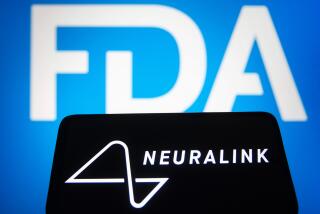FDA Approves Medtronic Heart Device
- Share via
WASHINGTON — The government Tuesday approved a groundbreaking new therapy for thousands of congestive heart-failure patients, a novel pacemaker-like device that could help their struggling hearts beat more normally.
Medtronic Inc.’s InSync system works by boosting the heart’s pumping power with a technique called cardiac re-synchronization. Cardiologists estimate it could help about 650,000 advanced heart-failure patients who can’t be helped by today’s best medicine.
“It’s a big breakthrough,” said Dr. David B. DeLurgio, an Emory University cardiologist who helped test the device for Medtronic. “It’s not for every heart-failure patient, but a proportion could definitely benefit.”
Until now, the Food and Drug Administration had approved only prescription drugs for the treatment of heart failure, a condition in which the weakened heart cannot adequately pump blood to the body.
Medtronic is expected to dominate a new market for heart-failure devices, which may be worth more than $1 billion by 2005, analysts said. Implanted devices for heart failure will be one of the top drivers of the medical device market, said analyst Ryan Rauch, head of medical devices at investment firm Adams Harkness & Hill Inc.
“It’s clearly a very positive event for Medtronic,” said Rauch, who owns no shares of Medtronic.
Dwight Warkentin, Medtronic’s business development director for heart failure, said, “We anticipate the InSync will produce $100 million in sales in its first year.”
Almost 5 million Americans have congestive heart failure. It’s not a heart attack or sudden heart stoppage. Instead, a heart weakened by age, damage from a survived heart attack or some other disease gets flabbier as it struggles to push blood out to the rest of the body.
Eventually, patients are pressed even to walk across a room. Fluid seeps into their lungs, blocking breathing. Just half survive five or more years. When medications fail, a heart transplant is the only option, but many patients are too old to qualify.
Enter the new therapy.
Pacemakers are widely used to zap hearts that beat too slowly or irregularly into a normal rhythm. Medtronic’s souped-up pacemaker works another way, boosting the beats of weak hearts. Medtronic beat two competing companies to get the device to market.
Up to half of heart-failure patients have hearts whose main pumping chambers, the left and right ventricles, don’t beat simultaneously, sapping the heart’s power. The InSync pacemaker delivers an electrical impulse--from a small pulse generator in the chest down three wires implanted in the heart--that makes the ventricles pump together.
In a study of 579 patients, those using the pacemaker experienced significant improvement, Food and Drug Administration reviewers concluded in approving the device. The study lasted just six months and didn’t measure whether the device had any effect on prolonging life. But doctors say that for these patients, improving quality of life in the short term is a big goal.
“It’s not a new heart, but it’s an improvement,” FDA medical reviewer Dr. Bram Zuckerman said.
InSync is only for advanced patients unaided by the best medical therapy, he said, cautioning that it’s not a replacement for medications.
Because InSync is different than standard pacemakers, with an additional wire snaked into a different part of the heart, the FDA is requiring Medtronic to specially train cardiologists before doctors can begin implanting the device.
But Minneapolis-based Medtronic is prepared to begin selling the device to trained physicians immediately and said the operation should cost $10,000 to $12,000.
The FDA approval gives Medtronic a leg up over chief rival Guidant Corp., which in July failed to receive a favorable ruling from an FDA panel for a similar product.
The rapid approval took medical device industry analysts somewhat by surprise. “It’s unexpected that it would come this early,” said Kurt Kruger, who follows Medtronic for Banc of America Securities. “We had thought it would be late fall. Here it is the dog days of summer.”
Kruger said the early approval bolsters his projection that the device will add about $90 million in sales over the next four quarters.
“This is great news for Medtronic,” said William Blair & Co. analyst Benjamin Andrew. “They are at least a month, maybe three months ahead of schedule, and for a company to get approval so quickly is a strong statement by the FDA as to the safety and efficacy of this product.”
Andrew said he did not expect the FDA’s approval until the end of September or early October. He said the news puts Medtronic at least four months--and possibly six to eight months--ahead of Guidant in the marketplace.
Separately, Medtronic said it closed its $3.8-billion acquisitions of Sylmar-based MiniMed Inc. and Medical Research Group, as expected, providing the company with an entry into the diabetes market.
Medtronic shares fell 23 cents to close at $46.52 on the New York Stock Exchange. The company’s shares have dropped 23% this year, more than the 15% drop in the Standard & Poor’s medical products index. Shares of Guidant fell $1.14, or 3%, to $37.51 on the NYSE.
*
Bloomberg News, Reuters and Associated Press were used in compiling this report.
More to Read
Inside the business of entertainment
The Wide Shot brings you news, analysis and insights on everything from streaming wars to production — and what it all means for the future.
You may occasionally receive promotional content from the Los Angeles Times.









